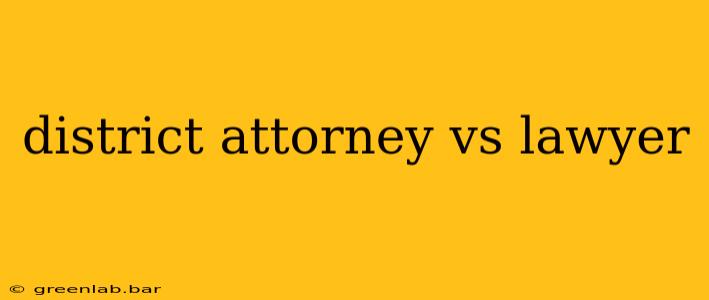The terms "District Attorney" and "Lawyer" are often used interchangeably, leading to confusion. While a District Attorney is a lawyer, the roles and responsibilities are vastly different. This post will clarify the distinctions between these two legal professionals, exploring their functions within the justice system and highlighting the key differences in their day-to-day work.
What is a Lawyer?
A lawyer, also known as an attorney, is a legal professional licensed to practice law. This broad definition encompasses a wide range of specializations, including:
- Criminal Defense Lawyers: These lawyers represent individuals accused of crimes, working to protect their rights and ensure a fair trial.
- Civil Lawyers: These lawyers handle non-criminal legal matters, such as contract disputes, personal injury claims, and family law issues.
- Corporate Lawyers: These lawyers advise businesses on legal matters related to their operations, such as mergers and acquisitions, intellectual property, and regulatory compliance.
- And many more... The legal field is diverse, with lawyers specializing in areas like environmental law, immigration law, and intellectual property law.
Essentially, a lawyer's role is to provide legal advice, representation, and advocacy to their clients. Their primary responsibility is to uphold the law and represent their client's interests within the bounds of the legal system.
What is a District Attorney (DA)?
A District Attorney, also known as a State's Attorney, County Attorney, or Prosecutor, is a public official responsible for prosecuting criminal cases within a specific jurisdiction (a county, district, or state). They are employed by the government and represent the state or people in criminal proceedings. Unlike private lawyers who represent individual clients, a DA represents the interests of the public in seeking justice.
Key Responsibilities of a District Attorney:
- Investigating Crimes: DAs work with law enforcement to investigate alleged crimes, gathering evidence and interviewing witnesses.
- Filing Charges: They decide whether to file criminal charges against individuals, based on the evidence gathered.
- Presenting Cases in Court: DAs are responsible for presenting the prosecution's case in court, arguing for the defendant's guilt and seeking appropriate punishment.
- Negotiating Plea Bargains: They may negotiate plea bargains with the defense, offering reduced charges or sentences in exchange for a guilty plea.
- Overseeing Criminal Investigations: They ensure proper procedures are followed during the investigation and prosecution of criminal cases.
District Attorney vs. Lawyer: A Comparison Table
| Feature | District Attorney (DA) | Lawyer |
|---|---|---|
| Employer | Government (State, County, or District) | Private firms, government agencies, or self-employed |
| Client | The state/people; represents the public interest | Individual clients or organizations |
| Primary Role | Prosecute criminal cases | Provide legal advice and representation |
| Specialization | Criminal law (specifically prosecution) | Varies widely (criminal defense, civil, corporate, etc.) |
| Responsibilities | Investigating crimes, filing charges, court representation, plea bargaining | Legal counsel, litigation, contract negotiation, etc. |
Conclusion: Distinct Roles in the Legal System
While all District Attorneys are lawyers, not all lawyers are District Attorneys. The DA's role is a specific subset within the broader legal profession, focused entirely on the prosecution of criminal cases in the public interest. Understanding this distinction is crucial for navigating the legal system and appreciating the diverse roles within the field of law. Their contrasting responsibilities and allegiances underscore the essential balance of power within a fair and just legal system.

